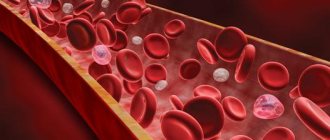Monitoring the course of pregnancy is periodic observation of the normal development of the fetus and the health of the expectant mother at different stages of gestation by conducting clinical and laboratory tests. One of these is urine analysis.
Any deviations from the norm in the urine of a pregnant woman may indicate pathological processes in the body of the unborn child. The appearance of white flakes in the urine during pregnancy serves as a signal to immediately consult a doctor in order to identify their causes and eliminate this syndrome.
Causes of white flakes in urine during pregnancy
Sediment in the urine, noticeable even to the naked eye, makes any person wary.
A pregnant woman perceives the world much more sensitively than usual, so you should understand: white flakes in a woman’s urine will not always be a sign of pathology.
In a healthy body, urine is formed without sediment or impurities, light yellow in color, transparent and almost odorless.
The appearance of white impurities in urine is possible for the following reasons:
- kidney pathologies;
- an increase in the amount of mucous secretion from the vagina;
- the appearance of protein in the urine;
- failure to comply with hygiene rules;
- dietary disorders.
Particular attention should be paid to the urine collection technique. Even against the background of absolute health, if the sampling is performed incorrectly, a laboratory analysis may show the presence of a non-existent pathology.
Before collecting urine, you should thoroughly rinse the perineal area with warm boiled water and wipe dry with a clean towel. A package with a special test container purchased at a pharmacy should be checked for integrity and tightness. After filling, the jar is tightly closed with a lid and placed on a special tray, from where the laboratory assistant will take it. A simple procedure will help avoid misdiagnosis and unnecessary anxiety for the health of mother and child.
Causes of occurrence in women
A complete answer to the question of why the structure or color of a waste product changes can only be given by a knowledgeable specialist. Self-diagnosing and identifying causes can lead to undesirable consequences.
White flakes in the urine during pregnancy may appear for a completely harmless reason. These are nutritional disorders, or rather, a significant change in the diet that has become a habit for the body.
Very often, cases are recorded when a person switches to a vegetarian diet, as well as when the amount of protein consumed is increased: those products where there is a lot of it. Expectant mothers often become victims of “proper” nutrition, which, if not agreed upon with the gynecologist, becomes the cause of many diseases.
The reasons for the appearance of white flakes in women may be the following:
- unbalanced menu;
- inflammation processes;
- excessive concentration of protein in the body;
- disturbances in the state of microflora.
An overestimated protein level is usually used to diagnose many infectious diseases. For example, cystitis and pyelonephritis are common. There is a high probability of urethritis. The latter is characterized by fairly strong discharge in the form of white flakes, and the patient also feels constant discomfort, burning in the vaginal area, and severe pain. The dynamics of the disease are quite rapid due to the proximity of the genital organs to the urinary canal and the width of the ureters.
Find out more about cystitis in women
Physiological changes in urine during pregnancy
Sediment in the urine during pregnancy will not always indicate a disease. An increase in the load on the kidneys that occurs in the later stages, especially during large-fetal pregnancy, is often characterized by a deterioration in blood tests. Regular monitoring of the condition by medical professionals is enough so as not to worry about the expectant mother and child.
Common household reasons can also affect the formation of urine - attention is paid to the water-salt balance. If you do not drink your daily fluid intake during pregnancy, changes in your urine will not take long to occur. The color of the resulting urine becomes richer, and the concentration becomes higher.
Significant disturbances in eating style, even if they occur just once, will certainly be detected in the analyses. Eating foods rich in protein (meat, eggs, dairy products, nuts) leads to the appearance of protein in the urine in the form of thick foam, which does not settle for a long time. In such a case, the true cause of the appearance of flakes requires dietary correction under the supervision of a doctor, but is in no way a symptom of disease.
Preventing the appearance of white flakes in pregnant women
To prevent such a symptom as white flaky inclusions in urine, pregnant women should:
- Don't get too cold.
- Observe the rules of personal hygiene (in the morning and evening, wash the genitals with clean water or a special gentle product, change your underwear daily, which should be natural).
- Monitor proper nutrition and body fluid balance (the amount of fluid you drink and its excretion).
- Avoid overexertion, excessive physical activity, and stressful situations.
- Monitor the sensations in your body. If you have any suspicious symptoms or signs, consult a doctor.
- Do not self-medicate.
Pathological factors of flakes in urine during pregnancy
Most often, changes in the composition of urine occur as a result of disruption of the natural balance of microflora. The patient feels constant discomfort, burning, itching and pain when urinating, which indicates possible inflammation. Bacteria provoke the development of an acute form of cystitis and complications in the form of pyelonephritis and glomerulonephritis. These diseases have rapid dynamics. The leading symptom of such conditions is discomfort in the lumbar region, and other manifestations may also occur:
- swelling of the face and limbs;
- change in body temperature;
- unnatural shade of urine;
- increased blood pressure and headaches.
Copious vaginal discharge in the last week of pregnancy can form a false urinary sediment if urine collection is performed incorrectly. It is necessary to follow basic hygiene and toilet rules of the urinary system to avoid such mistakes.
Common causes of pathology
Flakes can also appear due to gynecological inflammation and high protein content in the urine. In such situations, a pregnant woman needs to undergo additional examination, which will require additional tests. This procedure will help find the exact reasons for the changes.
In addition, if there are no deviations from the norm in protein content in the blood of a pregnant woman, then this is a symptom of a disease in the organs of the genitourinary system.
Sediment in the urine may be evidence of emerging pyelonephritis or acute cystitis. The fact that a woman has such a disease will be indicated by an elevated temperature (in some cases it is low). In this case, acute pain occurs during urination and in the lumbar region.
In addition, the appearance of flakes may indicate that a woman has glomerulonephritis - a very dangerous disease, the signs of which are the occurrence of:
- Severe swelling
- Discomfortable sensations in the lumbar region
- Low or high blood pressure
- Sharp or dull headaches
Also, a characteristic sign of glomerulonephritis, in addition to the appearance of flakes, is a change in the color of urine. Most often, this disease occurs as a complication after a sore throat, rubella or measles.
Treatment and prevention of cloudy urine during pregnancy
While carrying a child, a woman’s body experiences significant functional stress, as it works simultaneously for two people, purifying the blood of mother and baby. Treatment of the phenomenon of flakes in urine is aimed directly at eliminating the cause. The attending physician selects individual dosages of the necessary drugs.
Self-medication on the advice of relatives and friends during pregnancy is absolutely unacceptable. Such behavior can only reduce the sensitivity of pathogenic agents to medications, and in the worst case, cause irreparable harm to one’s own health and the health of the unborn child. When prescribing a diagnosis, a woman should be aware of each test performed and its results, so as not to unnecessarily confuse herself about possible imaginary pathologies.
Pregnant women often have lowered immunity, which requires preventive measures. First of all, it is necessary to avoid hypothermia and stress. You need to monitor your diet, exclude fatty, spicy, salty foods, drink more liquids, for example, pure still water, herbal or green tea, compotes. In later stages of pregnancy, reduce physical activity and limit sports exercises.
Why are white flakes in urine dangerous in pregnant women?
During pregnancy, changes in the properties of the expectant mother's urine, including the appearance of foreign inclusions, can indicate both pathologies of fetal development and a difficult pregnancy. A pregnant woman can visually detect white flakes in her urine. This indicator should serve as a signal about the need for a laboratory urine test. Since white flakes appear against the background of excessive mucus production, they may indicate an inflammatory disease of the mucous membrane of the urinary tract.
In some cases, mucus enters the urine from the reproductive system when urine collection techniques are violated. Therefore, if flaky white inclusions are detected in a pregnant woman, a urine test should be repeated in compliance with hygiene rules.
If a woman is just planning to become pregnant, and white flakes are detected in her urine, which are simultaneously accompanied by symptoms of cystitis, pyelonephritis or colpitis, then it will be necessary to temporarily postpone conception until the reasons are clarified and all possible risks to the health of the mother and child are prevented.
Treatment
If white flakes are not the result of a violation of the rules for collecting biological material for analysis, then the cause of their occurrence is first determined. All therapeutic measures are aimed at eliminating the provoking factor. If a serious pathology is detected, when the flakes are squamous epithelial cells, the urine should be re-submitted for examination to avoid a diagnostic error.
When an infection is detected in the body, specific medications must be prescribed. They are selected by the doctor individually in each clinical case. This is due to the need to select antibiotics to which microorganisms do not have resistance.
If there is a relationship between white clots in the urine and vaginal discharge, the woman should additionally visit a gynecologist. The doctor will definitely conduct an examination and also take smears. It is strictly forbidden to self-medicate, as this can be dangerous to health.
It is important to remember that the appearance of white flakes in urine is not always a harmless phenomenon. In some cases, this particular symptom will indicate a severe pathology that occurs in a latent form. Therefore, you should not neglect a visit to an experienced urologist, who will make a diagnosis and develop treatment tactics.
Taking a general urine test
General analysis is not as simple a procedure as it might seem at first glance. In order for the results to be as reliable as possible, it is necessary to undergo preliminary preparation. Preparation for a urine test consists of several stages. Changes in color or transparency may indicate the onset of an inflammatory process or the development of pathology.
- First of all, a few days before the test, you need to avoid eating pigmented foods. These foods can significantly affect the color of urine (beets, carrots).
- Immediately before collecting urine, it is extremely necessary to carry out hygiene procedures. Antibacterial agents should not be used (this may affect the results of the study).
- When collecting the analysis, the container should not touch the genitals.
- Only the middle portion of the liquid should be collected, and the primary and last streams should be skipped.
- Urine should be stored for no more than 1-2 hours, and then delivered to the laboratory for testing.
- The collection must be carried out in the morning, before consuming any liquids or food.
By following these simple rules, your tests will be most accurate, which will make it easier to decipher them and determine the diagnosis. If flakes are detected in urine, you must consult with your doctor. It will help prevent the development of complications and pathologies.
What to do if a disease is detected
After white discharge has been detected, each woman will need to take a set of health measures:
- Initially, you should consult a doctor and get professional advice. Then an examination will be scheduled, which will reveal the cause of the disease. Tests will require urine and in some cases blood.
- In order for the treatment prescribed by the doctor to become more effective, you will need to follow a diet. Avoid fatty and fried foods. Do not consume foods that will harm your health and affect the body in general.
- If for this reason a woman cannot become pregnant, she will need to perform physical exercises, which will also return all body functions to normal. It is worth noting that the loads must be agreed upon with a doctor or specialist in this field.
- Get outdoors more often. This will not only contribute to a speedy recovery, but will also have a beneficial effect on the development of the child. Spend time outdoors more often, if possible, visit the seas and resorts. Mountain air is of particular value in curing this disease. Sunbathe, this will nourish the body with useful substances and relieve you of white discharge in urine.
- At the end of the recovery course, you will need to undergo repeated tests to ensure that the disease has subsided. After this, it is necessary to pay special attention to hygiene and the condition of the body as a whole.
If the disease returns after some time, treatment will need to be repeated. Often, after childbirth, the pathology leaves the woman’s body on its own, but you should not neglect your health and, after identifying the first symptoms, you need to get proper help.
Diet and folk remedies
You can adjust your diet and use traditional medicine recipes only after prior consultation with your doctor.
The general principles of diet therapy are aimed at reducing the consumption of foods high in protein, maintaining fluid balance, and controlling salt intake. To treat patients with infectious diseases and renal failure, a diet based on table No. 7 is used.
When using recipes from traditional healers, we must not forget that without drug therapy these methods are ineffective. It is better to approach the treatment of the problem comprehensively.
- Soda solution. An effective method when the cause of white flakes is candidiasis. It is necessary to wash with a soda solution in a ratio of 1 tsp. per glass of warm boiled water. The procedure is carried out before bedtime, no more than 3-5 days, to avoid drying out the mucous membranes.
- Calendula decoction. Used for washing and douching. For 0.5 liters of water you need 30 g of dry herb, the mixture is boiled for 15 minutes. and leave for 6-7 hours in a dark place. You can wash yourself for no more than 7 days, douche for no more than 5 days.
- Bearberry decoction. Increased anti-inflammatory properties make “bear ears” an effective remedy in the treatment of diseases of the urinary system. Pour 1 tbsp into 250 ml of boiling water. l. dry herbs and kept in a water bath for 40 minutes. Take 1⁄2 cup three times a day before meals.
Treatment of symptoms that occur
After determining the cause that accompanies the release of whitish flakes in urine, it is necessary to urgently begin treatment. Therapy consists of prescribing broad-spectrum drugs.
- Canephron. A drug that has an anti-inflammatory effect. It is prescribed 3 times a day, 1 tablet before meals.
- Amoxicillin. An antibacterial agent prescribed for the presence of white flakes in the urine caused by kidney disease. The drug is taken 1 tablet 3 times a day. If necessary, it is administered intramuscularly.
- Pimofucin. Prescribed to women if the symptom was caused by candidiasis. The medicine is prescribed topically or 1 tablet orally. After 3 days, repeat the course.
- Monurel. Pharmaceutical product of herbal origin. Prescribed in case of acute kidney disease. It helps relieve the patient’s condition, relieves pain and discomfort.
Diseases
Uncharacteristic inclusions in a woman’s urine can signal urethritis, cystitis, inflammation of the genital organs, nephritis, and gestosis in pregnant women. Additional symptoms indicate that the appearance of flakes is not physiological, but infectious. Urethritis and cystitis are accompanied by frequent and often painful trips to the toilet, there is a feeling of burning and stinging at the time of urination, as well as pain in the lower abdomen. With gynecological diseases such as vaginitis, vulvovaginitis, flakes enter the urine from the vagina.
Analysis collection procedure
A pregnant woman undergoes a general urine test at least once a month. The accuracy of the examination depends on how seriously the patient approaches the process of collecting analysis. Therefore, you need to follow certain rules. It is important to rinse the genitals thoroughly before collecting urine. It is not necessary to collect the entire volume of liquid. First, you need to urinate a little into the toilet, then into the container. Often flakes in the urine of women are detected due to improper preparation. After all, vaginal discharge that gets into the test material shows a problem where there really isn’t one. Therefore, repeat tests are often prescribed. Some doctors recommend using a tampon to eliminate unnecessary particles in a pregnant woman's urine. Regarding discharge, you should contact a gynecologist to check the state of the microflora.
The presence of flakes indicates a high protein content. The exact amount of this substance can be determined by examining urine collected during the day. Before submitting, be sure to:
- follow a diet;
- do not take medications;
- do not overwork;
- don't forget about hygiene.
All collected liquid is poured into one sterile container, the volume is determined, and 50 ml is poured from there, which is sent to the laboratory for research.










